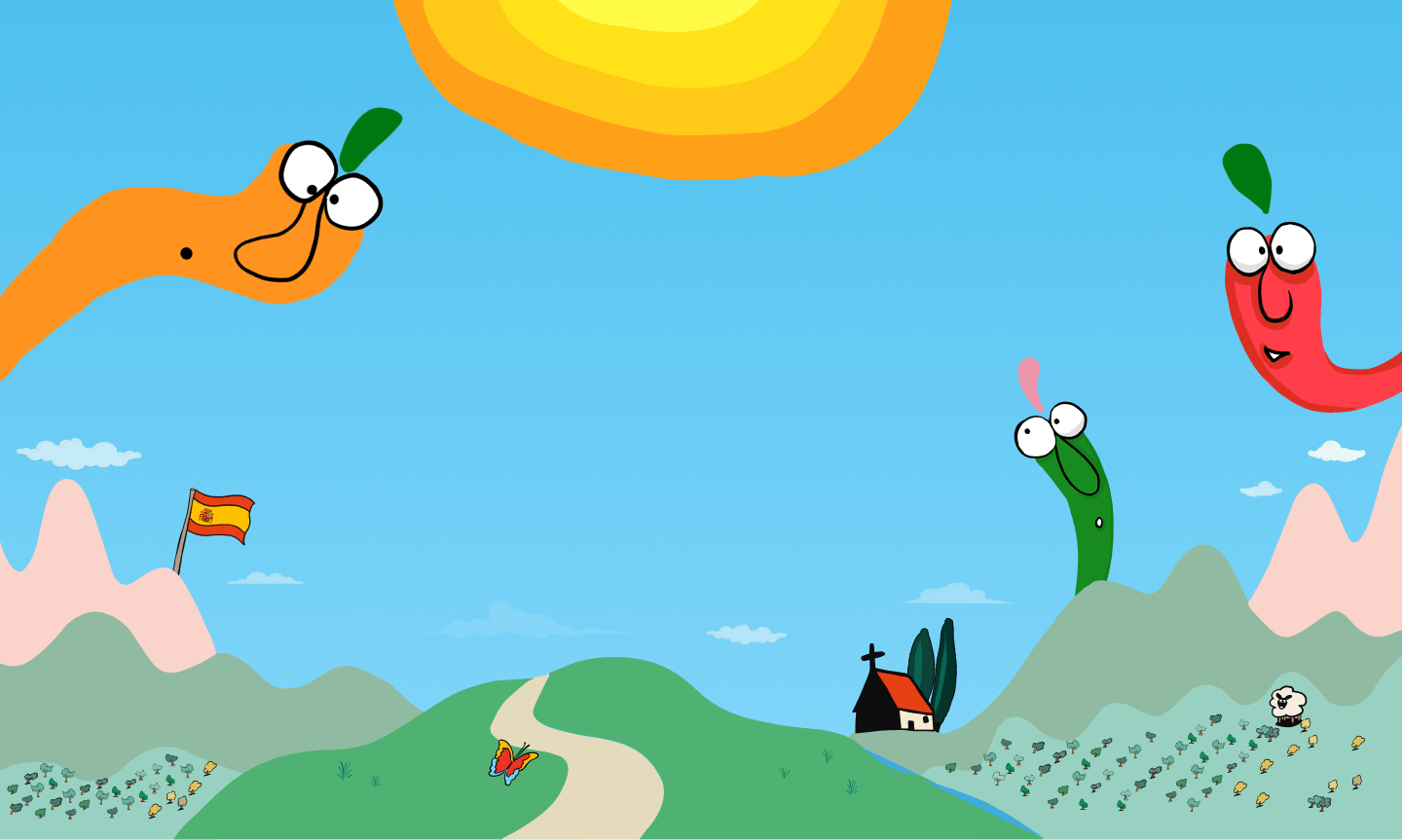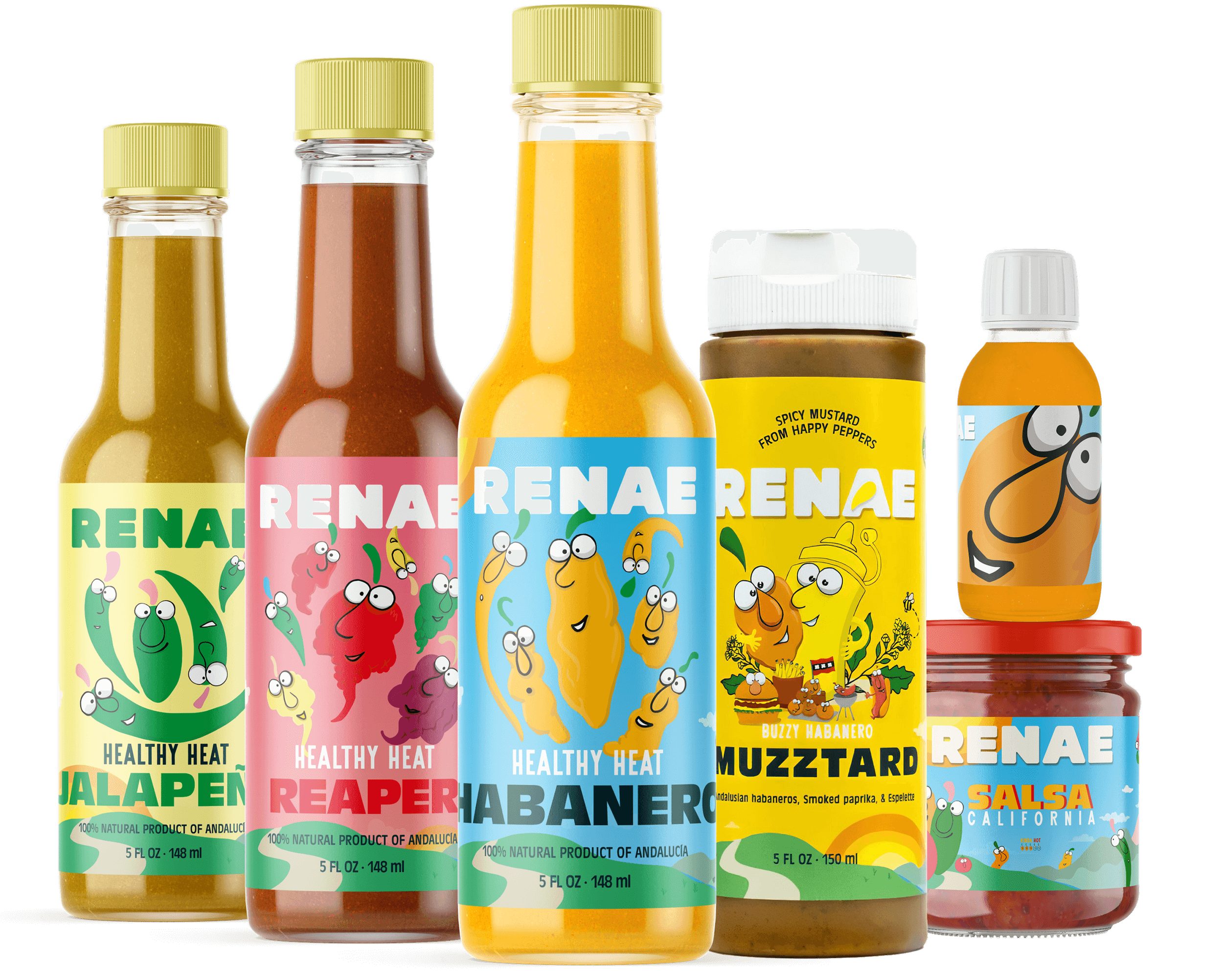
Add Some Feeling
All-natural heat in friendly sauces.
Renae is 100% natural sauces created with pure, local ingredients from small (magical) farms 👩🏽🌾 in Andalucía, Spain 🇪🇸 The perfect combo of soil 🌱 sun ☀️ and snowmelt 🏔️ for deeply thoughtful and emotionally-available peppers ☺️ Delivering a buzzy clean beautiful glow 🤸🏻 that warms from the inside out.
What is “healthy heat?”
No tears. No challenges. Just flavor that elevates and enhances.
Spice not pain
Real food grown in the ground from seed to bottle. No additives, preservatives, gums or thickeners.
No Preservatives All Natural
Buzzy clean
A blast of energy and zing to carry around even after your meal.
Small food from a small network of small farms in Andalucía, Spain. (We know everyone’s name.)
Fair trade Locally sourced
Small batch
Quality products don’t scale easily. Sorry. 🤷♂️ We made as much as we could.

〰️
gluten - free
〰️
no mass-produced, no genetically-dubious, no artificially-grown ingredients
〰️
100% natural
〰️
no preservatives
〰️ gluten - free 〰️ no mass-produced, no genetically-dubious, no artificially-grown ingredients 〰️ 100% natural 〰️ no preservatives
Everything - Free
Unlike regular hot sauce, Renae doesn’t add anything extra. No concentrated chili powder. No preservatives. Non-GMO. Just 100% natural healthy heat from the ground to your belly.
…for our chili pepper friends, until that Columbus guy and his buddies started “discovering” things. In just a few centuries, we dragged chili peppers all over the globe. Mixed and matched and tricked to get everything we could from them.
It was all tranquil, Latin America vibes…
Secretly adored, openly feared. Greeted with anxious squeals, rejected in painful tears. Maligned with names like “Devil,” “Scorpion,” “Reaper.” Slandered with myths of permanent bodily harm and graphic gastrointestinal distress.
But, what if…
…the little peppers are actually
OUR FRIENDS?
*Most of this is true. More info…

No old, dehydrated pepper powder. No preservatives. No additives, gums, thickeners. No ingredients flown in from wherever. No nonsense. Just all-natural healthy heat.
FAQs
-
If you look at ingredients, most hot sauces include one or more of the following - artificial stuff (preservatives, "natural" flavoring, coloring), dried powders, distilled vinegar, added sugar, pastes, fillers. They do this because it's cheaper. They do this because it's easier. They do this to improve margins.
Renae is different because everything in our bottle is natural and without preservatives, grown in the actual ground in one place - Andalucía, Spain.
Renae is different because we believe our ingredients come from the best conditions in Europe - almost year-round sun, fertile and diverse soil, and fresh groundwater from the Sierra Nevadas. You can see, smell, and taste the difference.
Our goal is to be part of the evolution of the chili pepper. From pain to feeling. From suffering to benefit. From explosions to buzzy, healthy heat.
-
Have you been to Andalucía in southern Spain? It's beautiful. It looks something like THIS and THIS.
Tucked away down there is a hidden valley with a small network of farms growing the most colorful, tastiest, organic vegetables and fruits. On one of these farms, our little pepper friends live and play in perfect harmony - spending their days lounging in warm sun, workshopping sketch comedy, and debating whether we're living through the "Golden Age of Television." Each pepper with a unique personality, background, and flavor. There's Harry Habanero, Julia Jalapeno, and Randy Reaper. There's 7 Pot Steve, Rocky Rocoto, and so many more. Like humans, peppers come in all shapes, colors, and sizes. They're open to every lifestyle, opinion, and philosophy. Mostly because peppers are inherently kind, but also because they know what it feels like to be misunderstood, mistreated, and maligned.
You see, peppers have a very unique relationship with humans. We took them all over the world, put them in our food, and celebrated their powers. But, along the way, we begain misusing those powers for commercial gain. A far-reaching marketing ploy to position chili peppers as devilish freaks of fiery damnation, apocalyptic explosions, and demonic apex predators. This approach sold bottles, pushed views on YouTube, and gave teenage boys something to do between Fortnite updates. But it also excluded a huge chunk of the world from understanding and experiencing the joy of chili peppers.
We started Renae as a platform to give chili peppers a voice. With the goal of being part of the chili pepper's evolution from novelty carnie freak show act to a positive part of our every day. A platform from which spicy peppers can be seen for who they really are - healthy magical gifts from nature. We aim to do that by making the cleanest, healthiest, and best sauces in the world. Sauces that guide more people to the health, flavour, and emotional benefits of the spicy pepper.
We believe opening your life to the spicy pepper brings buzzy joy, discovery, and health. A happy feeling that warms from the inside out.
-
Great question. The tapenade was considered. But ultimately disqualified under "limited market focused on the culturist, Leftist, Frenchist elitist." And Calabrian peppers in oil...well, we might be too late.
Hot sauce was the clear winner. A category still wildly immature and underexplored. Every hot sauce everywhere is a variation off the same core ingredients - 1) spicy peppers, 2) salt, 3) vinegar, 4) water - and yet we have a disjointed and inelegant collective perception of "hot sauce." For billions of people in noisy markets, around take-out windows, and food carts, the spicy sauce is a critical component to put food in mouth. It's an important part of food and, thereby, culture. Then, why do so many of us still disregard or actively avoid the pepper's heat? What have we done to make the chili pepper our enemy? Where’s the joy?
It got us thinking - "What if hot sauce is horribly miscategorized? What if making celebrities cry on YouTube isn't the smartest way to position a product? What if we communicate the benefits of spicy peppers instead?" And that got us here...debating how to make a Carolina Reaper look more like a Beanie Baby.
-
There are only two mammals in the world who eat chili peppers - the Indonesian tree shrew and human beings. Every other mammal purposely avoids the chili pepper. This is probably the plants' evolutionary strategy to have its peppers eaten by birds to encourage a broader distribution of its seeds. But we humans got in there and (like many things) accelerated the natural process to warp speed.
Why do humans have a unique (and unnatural) relationship with chili peppers? One guess is that something deep in our evolutionary core knows capsaicin (the heat-creating chemical in peppers) is good for us. (Possibly*) warding off fungi and delivering a slew of health benefits that (could*) include pain relief, improved digestion, and reduced inflammation. But mostly, it's a mystery. Is there something deeply hereditary? Or are chili peppers a magical, New World fruit that we’re only on the surface of understanding? 🤷
(*Our lawyers want us to frame all of this inconclusively, but a quick Google will pop peer reviewed papers on all of this.) -
There's a 15-min PBS documenatry HERE. It's amazing. Apparently, chili peppers are approximately 30,000 years old, but they were only in parts of Latin America and present-day Ecuador until European explorers stopped by. This was in the 1500s - not long ago. From there, the chili pepper raced around the world, becoming a staple ingredient in countless cuisines in just a few hundred years. From an evolutionary POV, it's bonkers how quickly these little peppers came out on the right side of Darwin. Why is that?
*Fun Fact!* Many cuisines we associate with spicy heat - Indian, Indonesian, Sichuan - weren't actually hot until the arrival of the chili pepper. Indonesia had sambal, but it was mostly ginger and sugar. The Sichuan pepper had numbed for thousands of years, but didn't deliver the heat it does today. And Vindaloo curry comes from Goa (a Portuguese colony), deriving from "carne de vinha d'alhos" - Portuguese for "meat with wine and garlic."
-
What is "healthy?" Churchill lived to be 90 but John Candy didn't make it past 43. Health and destiny have always been indiscriminate.
But if we get scientific, there is qualitative and quantitative evidence in support of health benefits from peppers - extended lifespan, lower blood pressure, inhibited inflammation, reduced risk of dying from cardiovascular disease and cancer, etc. "But," you say, "where's the empirical evidence? Everyone on YouTube and the socials seems to be really suffering from chili peppers!" And you'd be right. And this is exactly what we're trying to change.
If we work backward from the idea that health is an overall reflection of how we feel, then yes...absolutely, yes...chili peppers are healthy. What other food (or condiment) can provide a warm, tingly heat without relying on artificial substances, caffeine, sugar, or alcohol? Where else is there an all natural buzz with a built-in flavor pop?
We believe the general perception of and behavior toward chili peppers is keeping most of us from the physical, mental, and emotional benefits of adding a bit of healthy heat to our meals. Instead of misuse and overconsumption focused on intensity of heat, what if we made it easier for people to eat better with clean, flavor-forward spicy sauce?
-
Too much of anything isn't good. "Balance," "Moderation," "Buzz"...all the terms we skipped past in university apply now to this - your opening dance with the chili pepper. The current X-games self-flagellation pepper heat death sport depicted on the socials and YouTube is like beer pong with pure grain alcohol at a dorm party. You - a refined adult - have moved past this.
Start slow. Start low. Maybe a dash of Jalapeno sauce on eggs. A few drops of Habanero in a rice bowl. Consider what it does to the flavour. See how it makes you feel. Explore other combinations. Repeat.
The world begins to open up. Taste and smell gain dimensions. Bright colors constantly overlap. Soon, you're reaching for a bottle at almost every meal. You realize there's different sauces for different occassions, different flavours, different opportunities. You've become one of them - a "hot sauce person." You laugh. You're happy. You might book a flight to Mexico City. Maybe Oaxaca. Maybe you'll rent a van next summer and drive across France. Maybe you'll message your ex-, finally tell them you're sorry and that you value the time you had together.
The algorithms will notice your change. YouTube will start suggesting videos of Wim Hof and meditative hikes through the Alps. Instagram will optimize for glamour shots of street tacos and country homes in Menorca. (Twitter will continue to question your DeFi strategy and inability to flip subscription design-as-a-service businesses.)
You'll realize this is only the beginning. What other great, wondrous secrets are out there to explore? It's all so rich. It's all so spicy.
-
Scientists keep discovering more reasons why they were built by humans more than they weren't, but we're still arguing against. Not for the usual reasons - too big (2.3 million 2.5 ton stones in the Great Pyramid alone), too old (largest structure for nearly 4000 years until the Eiffel Tower) - but because the Egyptians didn't have a very basic and necessary tool…Microsoft Excel. How else could you project manage something that big? Sure, you can build amazing things with a million slaves, but without coordination it's a total mess. It wouldn't be surprising if they unearth an unbelievably long set of spreadsheet papyrus scrolls. But until then, we're dubious.




















